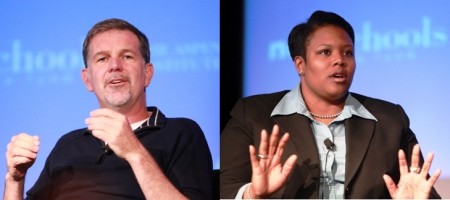 By Elizabeth Corcoran, Co-founder, EdSurge
By Elizabeth Corcoran, Co-founder, EdSurge
Telltale signs of an industry starting to gel seemed everywhere at the NewSchools Venture Fund’s annual meeting this past week in Burlingame:
Young—and over-caffeinated—entrepreneurs sporting “edupreneur” tee-shirts faced off in an “American Idol” like recital of business plans. Potential investors with expensive shoes and iPads lingered in receptions, swapping business cards with new acquaintances. Long-time educators clustered with former colleagues, comparing notes over who was collaborating with whom.
Capping the event was a news-making moment in the final on-stage panel presentation when Washington, DC chancellor, Kaya Henderson, gave a warm handshake to Netflix’s Reed Hastings, as he pledged to pay to bring blended-learning pioneer, Rocketship Education, to the district.
“Whatever it takes,” declared Hastings.
Is it for real? Is education arriving at the infamous “inflection point” for what has historically been one slowest moving industries on the planet?
Ted Mitchell, chief executive of NewSchools, concedes that the barriers to change have proven more formidable than he had ever anticipated. Even so, he adds, twenty years ago, people would have laughed at the notion of a startup rocking the world of education. Teach For America proved them wrong.
From Mitchell’s vantage, the pace of change has started to accelerate in the past three years. Now, “this is the dawn of the golden age of education entrepreneurship,” he asserts.
As a long-time technology journalist, I’ve chronicled the early stirrings of many industries—the early days of the PC, the giddy moments of the World Wide Web, the peripatetic emergence of nanotech and clean tech, and even the achingly slow-turned fiercely hot unfolding of China and India. Industry watching is almost as nerve-wracking and thrilling as watching your children grow.
And like kids, young industries are notoriously bad at growing up according to some master plan.

Just before Henderson and Hastings cut their deal, she was describing how Rocketship had been slow to return her calls, seemingly reluctant to take her up on an offer of as many as eight buildings to build charter schools in Washington, DC. Rocketship’s leadership may have good reason for foot dragging: the program is winning high marks for its schools but it’s painfully early days. Rocketship runs five schools in San Jose, focused largely on K through fifth grade. Its ideas, strategies, even technologies are still evolving. Catapulting it into the middle of the high-wire act that is the Washington DC public school district could make it grow up in a hurry—or could put the program under devastating fierce pressure.
We’ll find out. And we really will, because along with those other tell-tale signs add this: journalists, starting with www.EdSurge.com, starting to chronicle what promises to be an epic tale. Of course, it needs a name. (“Velvet revolution” was so sweet.) How about the “school bell revolution”—a transformation in what, when, where and how we learn.
Elizabeth (“Betsy”) Corcoran has been a writer and editor for Scientific American, The Washington Post, and Forbes. She is co-founder of the weekly newsletter, EdSurge, and building a community news and information site on education technology.